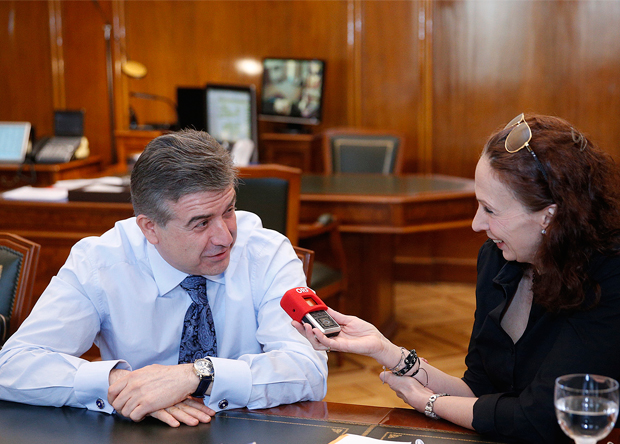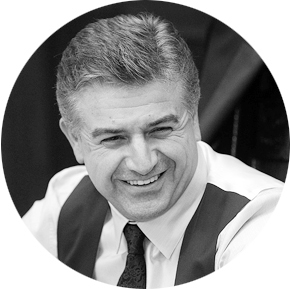Austrian Broadcasting Corporation (ORF) correspondent Elisa Vass recently visited Armenia and met with Prime Minister Karen Karapetyan. Elisa Vass permitted Mediamax to publish the full text of her talk with the head of Armenian government.
- What do you think is your main objective as a Prime Minister?
- Our main objective is to create a secure, independent, just and intellectual Armenia. We currently put the emphasis on the economy and try to create fair and equal conditions for the business and the investors.
- You mentioned before the elections that you expected investments of over USD 3 billion. Where will that money come from?
- We described all investments and expectations very precisely in our programs. In particular, we announced our plan to attract USD 3.2 billion in the next few years from five main sources: private business investments, loans, donor programs, state budget, and regional budgets. We consider it realistic to realize projects valued USD 830-840 million during 2017.
We published those numbers consciously, with the understanding that the society will demand reports from us. We intentionally set very high bars for ourselves, which makes all team members work to the best of their abilities.
- Could you bring an example of the expected investments?
- Lydian’s investments in out mining industry. We also have many projects for building an infrastructure of waste processing in Armenia’s marzes. There are other projects related with investments into greenhouse industry, road construction, a very interesting project of a copper plant.
- I spoke with people in Armenia, and many of them believe that the economy will develop only if the country becomes democratic and achieves peace with the neighbors. Do you agree?
- Of course, it’s great when a country has no problem with the neighbors. But that doesn’t mean we should just sit and let the grass grow under our feet if that condition doesn’t work. We want peace, but not by any means, not in exchange for our independence and national dignity. We are ready for constructive negotiations, but if the other party doesn’t express that readiness, I don’t think we have no alternative way to develop our economy.
- Which alternative way do you mean?
- I often bring up the example of Israel, another country with many problems. This is not about letting go of the attempts to establish peace in our region. But what can we do if our negotiation partner is not constructive? Naturally, we must develop the economy in existing conditions.

Photo: Tigran Mehrabyan
- Do you mean that Israel is an example for you?
- Yes, sometimes.
- But I don’t believe Israel has the same brain drain as Armenia.
- They had the same issue, but they created corresponding conditions to solve it. If you look at Israel’s first independent years, you’ll see they had similar problems.
- Do I get your meaning correctly that you don’t believe rapid achievement of peace with Azerbaijan and good relations with Turkey to be realistic?
- I didn’t say that. I said, and I’m ready to repeat that we want peace with sensible conditions. We are ready to be constructive, but I cannot predict when we’ll achieve something, as that doesn’t depend solely on our position.
- Do you think Armenia made the right choice by joining the Eurasian Economic Union?
- Yes, and I explained my position on this matter for many times. We joined a five-country club with total population of around 180 million people. Probability of realizing our products on that market is the largest for a number of reasons. That club has certain trade preferences. If we are successful there, which depends on us mostly, we can create good prerequisites for developing our economy. By joining the EAEU club, we don’t refuse other opportunities for our economy, including those related with Europe.
We tell potential investors that by coming to Armenia they get the opportunities to enter the Eurasian market and Iran too. We are establishing a free trade zone at the border with Iran now.
- You used to be Gazprom manager. Can you make decisions in complete independence from Moscow?
- I established very good relations and made many friends while working in Gazprom. But that doesn’t mean those friendships can influence Armenia’s national interests. On the contrary, they may help to find solutions in certain difficult situations.
- Are you ready to stay Prime Minister in 2018 and so become the head of the republic?
- I am.
- Would you like that?
- I have a very realistic approach to this. I never dreamed about becoming a Prime Minister and never strived to hold executive power. I formulate my current readiness as a desire to change a lot in our country and not to hold power.
- How do you imagine Armenia in 5 years? What should change?
- Many things should change in Armenia in 5 years: the procedure of decision-making, relations between the elite and the society, understanding of the elite’s role in public life, quality of education for our citizens and conditions for business.
- My first impression of Armenia is that Armenian people aren’t particularly optimistic. How can you affect the mood in the country?
- Unfortunately, we really have the moods you mentioned. There’s a certain historical aspect to that, as we frequently found ourselves in hard times and had to survive and fight for preservation of national identity throughout our history. Current social and economic conditions of living and the situation in the region are also factors that influence people’s attitude. But we intend to change that with our dedicated efforts.
Elisa Vass talked to Karen Karapetyan




















Comments
Dear visitors, You can place your opinion on the material using your Facebook account. Please, be polite and follow our simple rules: you are not allowed to make off - topic comments, place advertisements, use abusive and filthy language. The editorial staff reserves the right to moderate and delete comments in case of breach of the rules.